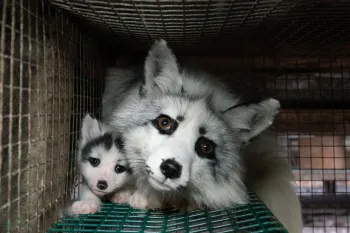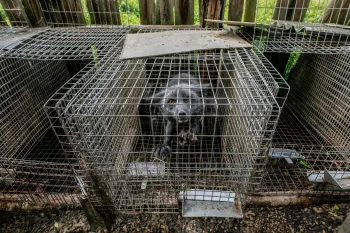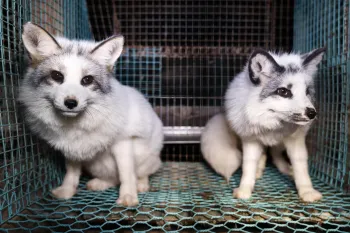WASHINGTON―Ahead of Fashion Weeks in New York, London, Milan and Paris, a global anti-fur consumer campaign has been launched to urge well-known outerwear brand Woolrich to join its competitors—including Canada Goose, Moncler, Napapijri, Patagonia and Parajumpers—in adopting a fur-free policy. The campaign is headed by animal charity Humane World for Animals (formerly called the Humane Society of the United States and Humane Society International) and the Fur Free Alliance, of which it is a member, comprising 50 organizations in more than 30 countries. Campaigners are asking their millions of supporters and compassionate citizens from around the globe to urge the brand to drop fur because it is cruel, out-dated and has no place in a modern society.
Much of the animal fur used for Woolrich’s parkas comes from fur factory farms, where wild animals such as raccoon dogs and foxes spend their entire lives in small wire-bottom cages, deprived of the ability to engage in natural behaviors—only to be killed by electrocution.
Woolrich also uses fur from coyotes who are trapped in the wild, caught in brutal devices like leghold traps or snares in which they can be trapped for days without food or water. Animals often gnaw off their own limbs in a desperate attempt to escape before the trappers return to kill them by bludgeoning or suffocation. Woolrich fur products include parka jackets with hood trims made from raccoon dog fur, coyote fur and fox fur.
PJ Smith, director of fashion policy at Humane World for Animals, says: “Woolrich remains one of the last few brands that continue to support the cruel fur trade despite overwhelming evidence of its harm to animals, the environment and public health. In doing so, the brand risks becoming increasingly out of touch in a world where ethical consumers are rejecting fur and the fur trade continues to lose footing in the fashion industry. We urge Woolrich to commit to going fur-free and take a stand for compassionate fashion.”
Woolrich claims it preserves and protects nature, yet the company continues to support a fur trade that not only unnecessarily kills tens of millions of wild species every year, but is also environmentally damaging and a risk to public health. Fur factory farms and tanneries are extremely harmful to our soil and waterways—pumping animal waste and toxic chemicals into the surrounding environment. The traps responsible for killing wild animals are indiscriminate, often maiming and killing non-target animals, including endangered species and companion animals. Fur farms are also breeding grounds for zoonotic diseases like COVID-19 and avian influenza, with hundreds of confirmed outbreaks on fur farms across Europe and North America in the last several years. If Woolrich truly cares about nature, it must choose to protect wildlife and their environment by going fur-free.
Fur Free Alliance chairman Joh Vinding says: “By continuing to support the fur trade, Woolrich is choosing animal cruelty and environmental devastation over compassion and innovation. Thankfully, cruelty is no longer in fashion, as consumers care more about animal welfare and new laws coming into force around the globe are ending the demand for fur products. Woolrich would be smart to get with the times and go fur-free.”
Woolrich’s use of fur is increasingly out of mode considering that most of the world’s major fashion-houses, outerwear brands and retailers have already gone fur-free, including Dolce & Gabbana, Saint Laurent, Valentino, Prada, Gucci, Versace, Alexander McQueen, Balenciaga and Jimmy Choo. Many other designers and retailers have long-standing policies against using fur, including Hugo Boss, Armani, Tommy Hilfiger, Stella McCartney and Vivienne Westwood. Quality, animal-friendly alternative fabrics, which incorporate plant based and recycled ingredients, are readily available. Today, more than 1,650 brands and retailers have pledged to go fur-free by joining the Fur Free Retailer Program.
Twenty-two countries throughout Europe have banned fur farming in response to concerns about animal cruelty and risks to the environment and public health. Israel, California and 16 cities across the U.S. have banned fur sales to create a more humane marketplace and drive innovation. On July 1, 2025, Switzerland imposed a ban on the import of cruelly produced furs. The ban is the first in Europe and comes into force with a two-year transition period.
Woolrich’s headquarters can be contacted about their use of fur via Humane World for Animals’ action page here as well as via Woolrich’s social media channels: X, Facebook, TikTok, YouTube and Instagram.
Download video/photos of Finnish fur farms here.
ENDS


